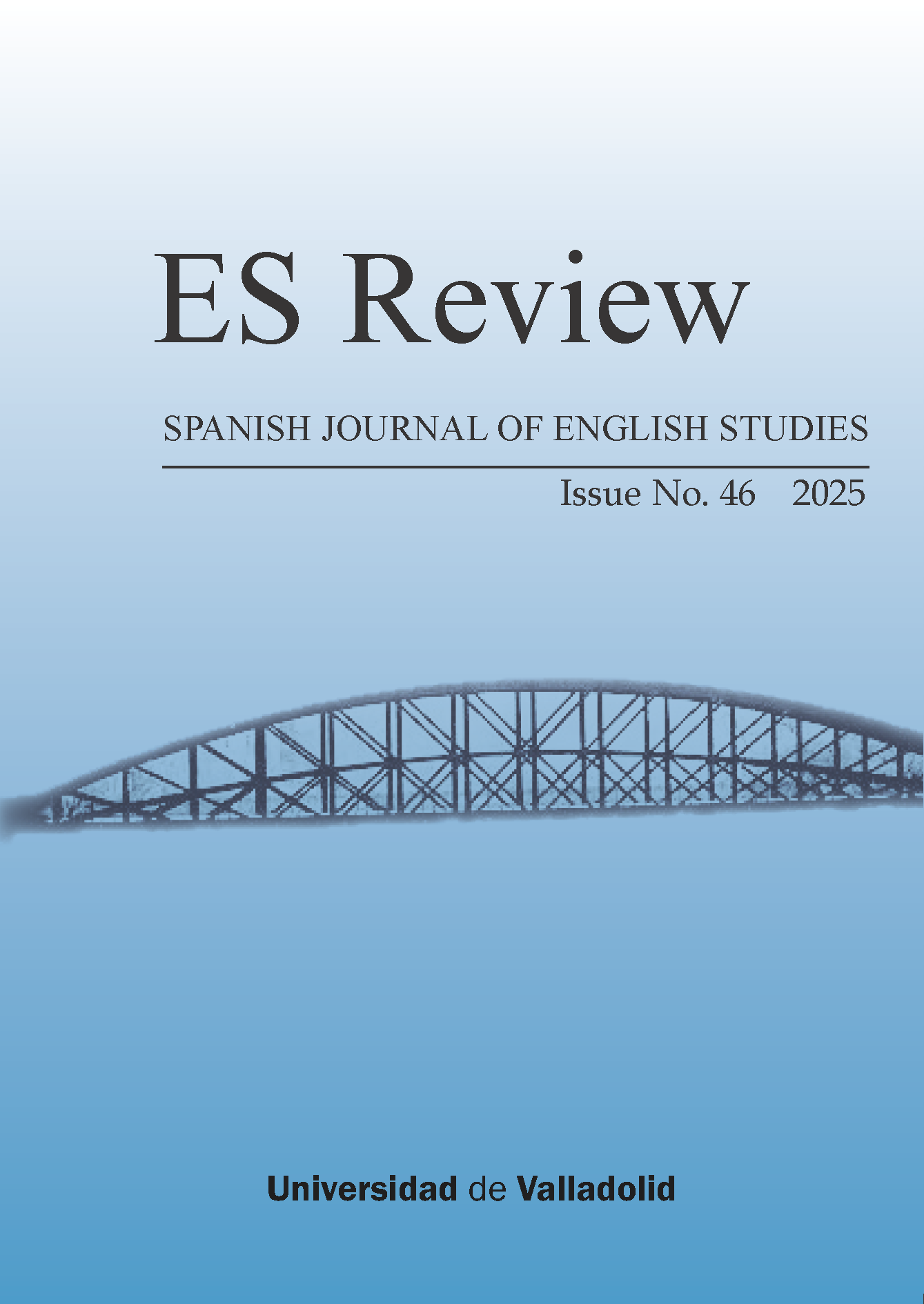When Fiction Becomes History: The Morphology of Context in the Short Stories of Bridget O’Connor
DOI:
https://doi.org/10.24197/xgatmz22Keywords:
Bridget O’Connor, Marcel Proust, context, morphology, history, fictionAbstract
Taking as its theoretical starting-point Bergson’s notion of subjective time and as a practical exemplar Proust’s In Search of Lost Time, this article contends that fiction has the capacity to morph historical context, thereby making it phenomenologically present to readers. As a formal contrast to Proust’s immense novel, Bridget O’Connor’s short stories are analyzed to show how even short fiction can give shape to context, in this case through aspects of style and characterization. As a result, conventional distinctions between history and fiction are elided, which in turn challenges conventional definitions of historical fiction.
Downloads
References
Bakhtin, Mikhail M. The Dialogic Imagination: Four Essays, edited by Michael Holquist. Translated by Caryl Emerson and Michael Holquist, Texas UP, 2020.
Calvino, Italo. Six Memos for the Next Millennium. Translated by Patrick Creagh, Jonathan Cape, 1992.
Carter, William C. Marcel Proust: A Life. Yale UP, 2000.
Collington, Tara. “Space, Time, and Narrative: Bakhtin and Ricoeur.” Space and Culture, vol. 4, no. 7–9, 2001, pp. 221–31, doi: 10.1177/120633120000300502.
Currie, Mark. About Time: Narrative, Fiction and the Philosophy of Time. Edinburgh UP, 2007, www.jstor.org/stable/10.3366/j.ctt1r1zgb/.
De Groot, Jerome. The Historical Novel. Routledge, 2010.
Doyle, Martin. “Jumping to the Wake-Up Call.” The Irish Times, 23 June 2007, www.irishtimes.com/news/jumping-to-the-wake-up-call-1.1211823/.
Dryden, John. Dramatic Essays, edited by William Henry Hudson. Dent, 1912.
Evans, Martina. “Bridget O’Connor: A Story-Telling Genius Before her Time.” The Irish Times, 23 June 2012, www.irishtimes.com/culture/books/bridget-o-connor-a-story-telling-genius-before-her-time-1.4576023/.
Foley, Barbara. Telling the Truth: The Theory and Practice of Documentary Fiction. Cornell UP, 1986, www.jstor.org/stable/10.7591/j.ctt207g5pj/.
Halliday, Michael A. K. “Language and the Order of Nature.” The Linguistics of Writing: Arguments between Language and Literature, edited by Nigel Fabb et al., Manchester UP, 1987, pp. 135–54.
Harry, Deborah, and Christopher Stein. “Die Young, Stay Pretty.” Eat to the Beat. Chrysalis Records, 1979.
Kant, Immanuel. Critique of Pure Reason, edited by Paul Guyer and Allen W. Wood. Cambridge UP, 1998, doi: 10.1017/CBO9780511804649.
Johnson, David B. “The Postmodern Sublime: Presentation and its Limits.” The Sublime: From Antiquity to the Present, edited by Timothy M. Costelloe. Cambridge UP, 2012, pp. 118–31.
Lázaro Lafuente, Luis Alberto. “A Chapter of the Moral History of London: An Interview with Bridget O’Connor.” Odisea, vol. 1, 2001, pp. 167–72, doi: 10.25115/odisea.v0i1.64.
Lukács, Georg. The Historical Novel. Translated by Hannah Mitchell and Stanley Mitchell, Merlin Press, 1962.
Lyotard, Jean-François. The Postmodern Condition: A Report on Knowledge. Translated by Geoff Bennington and Brian Massumi, Manchester UP, 1984.
Mata-Induráin, Carlos. “Retrospectiva sobre la evolución de la novela histórica.” La novela histórica. Teoría y comentarios, edited by Kurt Spang et al., Eunsa, 1995, pp. 13–63.
O’Connor, Bridget. Here Comes John. Jonathan Cape, 1993.
O’Connor, Bridget. Tell Her You Love Her. Jonathan Cape, 1997.
Poe, Edgar Allen. “The Philosophy of Composition.” Graham's Magazine, vol. XXVIII, no. 4, 1846, pp. 163–67, www.eapoe.org/works/essays/philcomp.htm/.
Proust, Marcel. In Search of Lost Time. Translated by Andreas Mayor et al., Vintage, 2000. 6 vols.
Ricoeur, Paul. Time and Narrative. Translated by Kathleen McLaughlin and David Pellauer, vol. 3, Chicago UP, 1988.
Rodwell, Grant. Whose History? Engaging History Students through Historical Fiction. Adelaide UP, 2013.
Sell, Jonathan P. A. “Bridget O’Connor.” The Literary Enyclopedia, www.litencyc.com/php/speople.php?rec=true&UID=15114/.
Sell, Jonathan P. A. “Commodified Identity and Materialist Allusion in the Short Stories of Bridget O'Connor.” Allusion, Identity and Community in Recent British Writing. Universidad de Alcalá, 2010, pp. 99–111.
Sell, Jonathan P. A. “Bridget O'Connor, Here Comes John.” The Literary Enyclopedia, www.litencyc.com/php/sworks.php?rec=true&UID=
41470/.
Sell, Jonathan P. A. Shakespeare’s Sublime Ethos: Matter, Stage Form. Routledge, 2022.
Sell, Jonathan P. A. “Transcendent Commodities: Magical Materialism in the Short Stories of Bridget O’Connor.” The Silent Life of Things: Reading and Representing Commodified Objecthood, edited by Alan Munton et al., Cambridge Scholars Publishing, 2015, pp. 55–81.
Shakespeare, William. The Complete Works, edited by John Jowett, et al. 2nd ed., Clarendon Press, 2005.
Stiegler, Bernard. “The Disaffected Individual in the Process of Psychic and Collective Disindividuation.” Extract from the third chapter of Mécréance et Discrédit: Tome 2. Les sociétés incontrôlables d'individus désaffectés (Editions Galilée, 2006), published as a working paper for the Ars Industrialis seminar, “Suffering and consumption,” 25 Feb. 2006. Translated by Patrick Crogan and Daniel Ross, 2006, arsindustrialis.org/disaffected-individual-process-psychic-and-collective-disindividuation/.
Wood, David. The Deconstruction of Time, 2nd ed., Northwestern UP, 2001.
Downloads
Published
Issue
Section
License
Copyright (c) 2025 Jonathan P. A. Sell

This work is licensed under a Creative Commons Attribution 4.0 International License.
Authors retain publishing rights and grant ES Review. Spanish Journal of English Studies right of first publication.
Simultaneously, all articles and reviews published in ES Review until nº 43 are available under a Creative Commons Attribution-NonCommercial 4.0 International License (CC BY-NC 4.0) while those published from nº 44 onwards will be available under a Creative Commons Attribution 4.0 International License (CC BY 4.0), by which others are allowed to share and use their work with an acknowledgement of the work’s authorship and initial publication in this journal.
In addition, ES Review allows authors to arrange additional contracts for the non-exclusive publication of the journal’s published version of the work (e.g., in a book), with an acknowledgement of its initial publication in this journal. In such a case, authors are required to approach the editor(s)/publisher to request permission.


